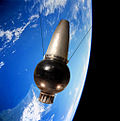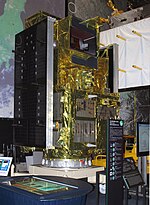Suzaku (formerly ASTRO-EII) was an X-ray astronomy satellite developed jointly by the Institute of Space and Aeronautical Science at JAXA and NASA's Goddard...
11 KB (844 words) - 20:08, 6 May 2024
also known as Suzaku, a video game developer Suzaku Avenue, one of the ancient main streets in Kyoto and Nara, Japan Suzaku (satellite), the name given...
2 KB (348 words) - 19:05, 22 May 2024
by Japanese astronomers who observed the Galactic Center with the Suzaku satellite. Astronomy portal Large Molecule Heimat List of molecules in interstellar...
10 KB (1,153 words) - 14:19, 2 November 2024
Astro (section Satellites)
ASTRO-EII or Suzaku (satellite), an X-ray astronomy satellite ASTRO-F or Akari (satellite), formerly known as IRIS, an infrared astronomy satellite ASTRO-G...
4 KB (496 words) - 00:00, 2 September 2024
results of research using the Japanese JAXA Suzaku satellite, after earlier work with the XMM-Newton satellite. "The observations include clocking the speed...
2 KB (254 words) - 17:30, 8 March 2024
by Japanese astronomers observing the Milky Way's center with the Suzaku satellite. In July 2019, astronomers reported finding a star, S5-HVS1, traveling...
73 KB (7,650 words) - 10:15, 10 November 2024
"lily"), also known as Broadcasting Satellite or BS, was a series of Japanese direct broadcast satellites. The first satellite of this series, called BSE or...
6 KB (325 words) - 18:27, 24 August 2024
Quasi-Zenith Satellite System (QZSS), also known as Michibiki (みちびき), is a four-satellite regional satellite navigation system and a satellite-based augmentation...
22 KB (1,873 words) - 06:09, 22 October 2024
Ōsumi (or Ohsumi, おおすみ) was the first Japanese satellite put into orbit. It was launched on February 11, 1970 at 04:25 UTC with a Lambda 4S-5 rocket from...
5 KB (241 words) - 10:21, 6 September 2024
Code Geass (redirect from Code Geass: Suzaku of the Counterattack)
the ruins of Japan as a background, Lelouch vows to his Japanese friend Suzaku Kururugi that he will one day obliterate Britannia as an act of vengeance...
107 KB (10,623 words) - 05:52, 6 November 2024
The Innovative Satellite Technology Demonstration Program is a series of spacecraft missions for testing technology and ideas put forward by universities...
24 KB (2,117 words) - 14:17, 3 August 2024
The Himawari (ひまわり, “sunflower”) geostationary satellites, operated by the Japan Meteorological Agency (JMA), support weather forecasting, tropical cyclone...
5 KB (249 words) - 14:46, 18 September 2024
Aqua (EOS PM-1) is a NASA scientific research satellite in orbit around the Earth, studying the precipitation, evaporation, and cycling of water. It is...
14 KB (1,301 words) - 07:13, 21 October 2024
X-ray satellites, which started in 1979, and it was designed to observe sources that are an order of magnitude fainter than its predecessor, Suzaku. Its...
27 KB (2,734 words) - 17:44, 17 October 2024
Advanced Land Observing Satellite (ALOS), also called Daichi (a Japanese word meaning "land"), was a 3810 kg Japanese satellite launched in 2006. After...
8 KB (485 words) - 18:38, 16 July 2024
height 280 km, apogee height 686 km, inclination 98.3 degrees. Then the satellite maneuvered to the quasi-circular Sun-synchronous orbit over the day/night...
15 KB (887 words) - 23:08, 27 October 2024
Ajisai (redirect from Ajisai (satellite))
Japanese satellite sponsored by NASDA, launched in 1986 on the maiden flight of the H-I rocket. It is also known as the Experimental Geodetic Satellite (EGS)...
8 KB (782 words) - 15:32, 4 April 2024
ASTRO-C, renamed Ginga (Japanese for 'galaxy'), was an X-ray astronomy satellite launched from the Kagoshima Space Center on 5 February 1987 using M-3SII...
9 KB (191 words) - 17:48, 23 June 2024
Gases Observing Satellite (GOSAT), also known as Ibuki (Japanese: いぶき, Hepburn: Ibuki, meaning "breath"), is an Earth observation satellite and the world's...
8 KB (502 words) - 13:47, 1 July 2024
Information Gathering Satellite (情報収集衛星, Jōhō Shūshū Eisei) are the satellites of the Japanese spy satellite program. It was started as a response to the...
13 KB (912 words) - 07:32, 26 September 2024
The Advanced Satellite for Cosmology and Astrophysics (ASCA, formerly named ASTRO-D) was the fourth cosmic X-ray astronomy mission by JAXA, and the second...
9 KB (745 words) - 17:46, 2 October 2024
interplanetary probes. First satellites from each country are included. Not included are most Earth science satellites, commercial satellites or crewed missions...
71 KB (794 words) - 14:26, 14 October 2024
JAXA (section Satellites for other agencies)
named Suzaku (ASTRO-EII). This launch was important for JAXA, because in the five years since the launch failure of the original ASTRO-E satellite, Japan...
68 KB (7,582 words) - 20:07, 23 October 2024
Multifunctional Transport Satellites (MTSAT) were a series of weather and aviation control satellites. They are replaced by Himawari 8 on 7 July 2015...
6 KB (617 words) - 14:59, 22 December 2023
ultraviolet astronomy satellite operated by the Japan Aerospace Exploration Agency (JAXA). The first mission of the Small Scientific Satellite program, it was...
9 KB (638 words) - 02:43, 22 July 2024
Trajectory Details (Suzaku)". NASA. Archived from the original on 2016-03-03. Retrieved 2008-02-27. "NASA – NSSDC – Spacecraft – Details (Suzaku)". NASA. Archived...
130 KB (5,634 words) - 14:00, 4 November 2024
AKARI (ASTRO-F) was an infrared astronomy satellite developed by Japan Aerospace Exploration Agency, in cooperation with institutes of Europe and Korea...
14 KB (1,020 words) - 13:09, 7 September 2024
also known as ASTRO-A before launch, was a Japanese X-ray astronomy satellite. It was developed by the Institute of Space and Astronautical Science...
6 KB (252 words) - 12:47, 24 June 2024
The Nano-Japan Astrometry Satellite Mission for Infrared Exploration (Nano-JASMINE) is an astrometric microsatellite developed by the National Astronomical...
12 KB (1,019 words) - 06:45, 10 November 2024
November 2021 by an Epsilon launch vehicle as part of the Innovative Satellite Technology Demonstration Program-2 mission. The key technology to be tested...
5 KB (397 words) - 03:08, 6 February 2024



















